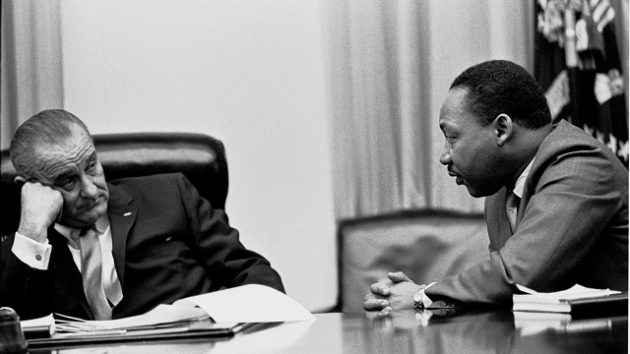Selma and the Sanctimony of Liberals
The film’s portrayal of LBJ has the left up in arms.
It’s always interesting to witness the sanctimony of liberals (usually Democrats) when their narratives of history are challenged by those they say they “helped.” Thus it has happened with the movie Selma, which has focused negative attention on President Lyndon Johnson, so much so that my Google search for “Lyndon Johnson” brought up as the second entry (after the first Wikipedia entry) a Hollywood Reporter article.
The film’s director, Ava DuVernay, has said she did not want to follow other movies such as The Help that present whites as “saviors.” But Joseph Califano, Johnson’s “top assistant for domestic affairs,” charged in the Washington Post that the film “falsely portrays President Lyndon B. Johnson as being at odds with Martin Luther King Jr. and even using the FBI to discredit him, as only reluctantly behind the Voting Rights Act of 1965 and as opposed to the Selma march itself.” Califano even claimed that the Selma march was Johnson’s idea.
Other commentators also made corrections. Three days before the film’s Christmas Day release, Politico ran LBJ library director Mark Updegrove’s long feature that asserted that LBJ and Martin Luther King, Jr. were “close partners” in reform. Post columnist Richard Cohen rushed to Johnson’s defense and reported that director DuVernay had the temerity to call Califano’s assertion “jaw dropping and offensive.” Then in what Cohen called a “brush off of a tweet,” Duvernay advised getting the true historical account by “interrogating history”–by seeing her movie.
But it seems that all bases need to be covered, and on January 5, 2015, the Post published another article, this time about a “quiet battle” Johnson as vice president waged in 1961 as he and his wife challenged restrictive real estate covenants of their “elite” Northwest Washington neighborhood, “The Elms.” The reporter, Karen Tumulty, must have searched for this nugget. But she saw no irony in the fact that the anti-poverty future president with a penchant for social engineering was motivated by the fact that “diplomats from African nations . . . found it difficult to find suitable housing.”
The Post has published well over a dozen articles on the movie.


